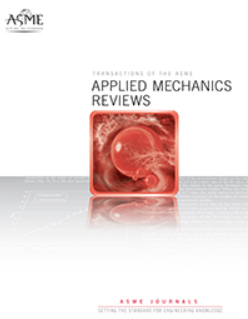Numerical Analysis of Cracked Double-Beam Systems
IF 16.1
1区 工程技术
Q1 MECHANICS
引用次数: 0
Abstract
Based on elasticity theory, this paper discusses the static analysis of a cracked double-beam system in the presence of a Winkler-type medium. It is further assumed that the double-beam system is constrained at both ends by elastically flexible springs with transverse and rotational stiffness. Using a variational formulation, the governing static equations are derived and solved using analytical and numerical approaches. In the first approach, closed-form solutions for the displacement functions are obtained based on the Euler–Bernoulli beam theory. In the second approach, the Cell Discretisation Method (CDM) is performed, whereby the two beams are reduced to a set of rigid bars connected by elastic constraints, in which the flexural stiffness of the bars is concentrated. The resulting stiffness matrix is easily deduced, and the governing equations of the static problem can be immediately solved. A comparative analysis is performed to verify the accuracy and validity of the proposed method. The study focuses on the effect of various parameters, including crack depth and position, boundary conditions, elastic medium and slenderness. The validity of the proposed analysis is confirmed by comparing the current results with those obtained from other approaches. In particular, the results obtained by closed-form solution and CDM are compared with the Finite Element Method (FEM). The accuracy of the results was assessed by making comparisons with results found in the literature and reported in the bibliography. It was shown that the proposed algorithm provides a simple and powerful tool for dealing with the static analysis of a double-beam system. Finally, some concluding remarks are made.裂纹双梁系统的数值分析
本文从弹性理论出发,讨论了温克勒型介质存在时裂纹双梁系统的静力分析问题。进一步假设双梁系统两端受具有横向和转动刚度的弹性弹性弹簧约束。采用变分公式,推导了控制静态方程,并采用解析和数值方法求解。在第一种方法中,基于欧拉-伯努利梁理论得到位移函数的闭型解。在第二种方法中,执行单元离散方法(CDM),其中两个梁被简化为一组由弹性约束连接的刚性杆,其中杆的抗弯刚度集中。由此得到的刚度矩阵可以很容易地推导出来,并且可以立即求解出静力问题的控制方程。通过对比分析验证了所提方法的准确性和有效性。重点研究了裂纹深度和位置、边界条件、弹性介质和长细比等参数的影响。通过与其他方法得到的结果进行比较,证实了所提出分析的有效性。特别地,将封闭解和CDM法的计算结果与有限元法进行了比较。结果的准确性是通过与文献和参考书目中报告的结果进行比较来评估的。结果表明,该算法为处理双梁系统的静力分析提供了一个简单而有力的工具。最后,作了结束语。
本文章由计算机程序翻译,如有差异,请以英文原文为准。
求助全文
约1分钟内获得全文
求助全文
来源期刊
CiteScore
28.20
自引率
0.70%
发文量
13
审稿时长
>12 weeks
期刊介绍:
Applied Mechanics Reviews (AMR) is an international review journal that serves as a premier venue for dissemination of material across all subdisciplines of applied mechanics and engineering science, including fluid and solid mechanics, heat transfer, dynamics and vibration, and applications.AMR provides an archival repository for state-of-the-art and retrospective survey articles and reviews of research areas and curricular developments. The journal invites commentary on research and education policy in different countries. The journal also invites original tutorial and educational material in applied mechanics targeting non-specialist audiences, including undergraduate and K-12 students.

 求助内容:
求助内容: 应助结果提醒方式:
应助结果提醒方式:


